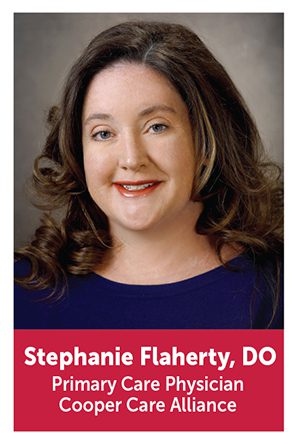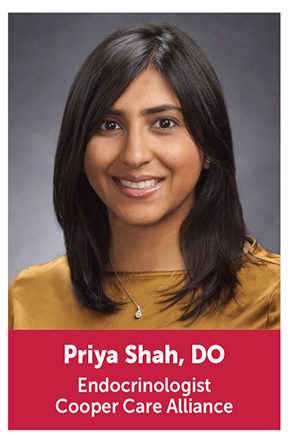Cooper: Healthy At Every Age
A woman’s guide to living well

It’s a familiar story: Many women are so busy taking care of others, they forget to care for themselves. Cooper Care Alliance physicians encourage women to practice self-care and prioritize their health care.
“Most women know what they should do to stay healthy, but keeping that a priority while managing daily life becomes difficult,” says Stephanie Flaherty, DO, primary care physician with Cooper Care Alliance. “Finding time for self-care can be hard. You can push yourself only so far before your body starts to fight back.”
Dr. Flaherty says there are basic but important steps women of all ages can take to stay healthy: Drink enough water, improve your sleep quality, eat a well-balanced diet, exercise 30-60 minutes 4 or 5 days a week, and stay up to date on recommended screenings. In addition, each age group can take specific steps to help stay well.
Your 20s & 30s
“In your 20s, you feel invincible,” says Dr. Flaherty. “But this is the time when you want to establish a relationship with a primary care doctor. You want someone who knows you well enough to pick up on subtle differences in your health, and who will say, ‘Hey, let’s look into this a bit more.’ Start developing that relationship early.”
 Women at this time are also having – or raising – children, and some may be experiencing infertility issues. Dr. Flaherty says to watch for increased stress levels, especially if you are trying to conceive.
Women at this time are also having – or raising – children, and some may be experiencing infertility issues. Dr. Flaherty says to watch for increased stress levels, especially if you are trying to conceive.
“That’s another benefit to having a good relationship with your doctor. You can have an open conversation where you discuss your goals for starting a family. Then your doctor can advise you on what to expect and how to best reach that goal.”
Your 40s, 50s & Beyond
Most women enter perimenopause and menopause in their 40s and 50s, Dr. Flaherty says. “It can be an erratic time, because there is no way to predict how that process will affect your health.”
Common symptoms include hot flashes, abdominal bloating, vaginal dryness, and mood irregularities. “It can be very frustrating,” she adds, “but there are some things we can do to help. Birth control can be used successfully to regulate hormones, and topical estrogens work well for dryness. Sometimes hormone replacement therapy can be beneficial. If your symptoms are significantly impacting your quality of life, they should be treated.”
 Bone health is also important during this time. “As women continue to age, it’s important they get adequate amounts of vitamin D and calcium in their diet or through supplements,” says Priya Shah, DO, an endocrinologist with Cooper Care Alliance. “They should also make sure they’re staying active. I recommend a combination of aerobic and anaerobic exercise, along with weight-bearing exercise, if that is physically possible.” Dr. Shah also recommends women consume at least 1000 units of vitamin D and 1000 to 1200 milligrams of calcium every day. (Most over-the-counter calcium supplements also contain vitamin D, she says.)
Bone health is also important during this time. “As women continue to age, it’s important they get adequate amounts of vitamin D and calcium in their diet or through supplements,” says Priya Shah, DO, an endocrinologist with Cooper Care Alliance. “They should also make sure they’re staying active. I recommend a combination of aerobic and anaerobic exercise, along with weight-bearing exercise, if that is physically possible.” Dr. Shah also recommends women consume at least 1000 units of vitamin D and 1000 to 1200 milligrams of calcium every day. (Most over-the-counter calcium supplements also contain vitamin D, she says.)
The concern for women over 50 is osteopenia – meaning your bones are starting to weaken – and osteoporosis – where your bones have weakened significantly, so there is a high risk for fracture. Women who are diagnosed with osteoporosis, determined through a bone density test or DEXA Scan, can take medications to prevent further bone loss. “You can’t reverse osteoporosis, but you can help improve your bone density to prevent any fracture,” says Dr. Shah.
Dr. Shah wants women to talk to their doctor about getting a bone density screening and blood work to find their vitamin D and calcium levels.
And that’s where that relationship with a doctor you (hopefully) started in your 20s comes in to play. “You don’t want to just see your doctor when you’re sick,” Dr. Flaherty says. “Instead, check in with your physician at least once a year to ensure your health is in good shape.”
In the event that your health situation changes, having an established relationship with your doctor means they will have an understanding of your unique needs. If you don’t currently have this kind of relationship with your doctor, Dr. Flaherty advises starting one now. “It’s crucial to trust your instincts and seek medical attention if something feels off.”


